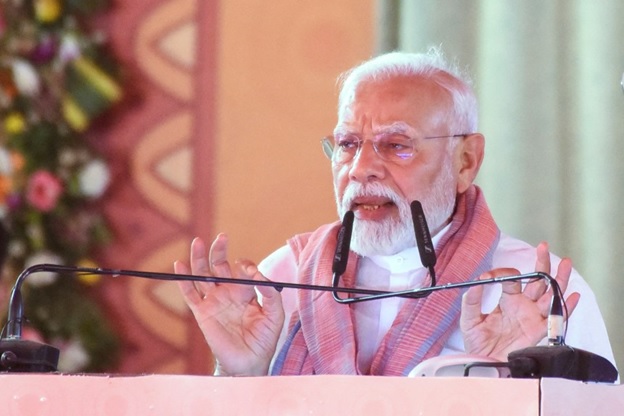
Indian Prime Minister Narendra Modi put the Indus Waters Treaty “in abeyance” last week - Stringer/Reuters
Are India and Pakistan on the Cusp of War over Water?
By Matthew Campbell
On Friday the Indian minister Gajendra Singh Shekhawat said: “Not a single drop of water meant for India will be allowed to flow into Pakistan.” His response suggested that Delhi might be serious about “weaponizing” rivers that are lifelines for millions of people in neighboring Pakistan.
For 60 years the Indus Waters treaty, which guarantees the cross-border flow of river water, survived wars, border skirmishes and diplomatic disputes; rivers sustaining people in both countries kept moving, untouched by politics.
Those days may be over: some analysts fear that this latest crisis heralds a new age of “water wars”, with Delhi seeking to divert rivers crucial for Pakistan’s agriculture.
“It’s worrisome,” said Peter Gleick, a global water policy expert, author of The Three Ages of Water and a member of the US Academy of Sciences. “This treaty has withstood all crises. For India to use it now as a lever against Pakistan is a disturbing sign of the growing use around the world of water as a tool of conflict.”
If India tried to divert water from Pakistan, it could spark a regional conflict over water that could end badly for India itself, warned Aaron Wolf, a conflict resolution specialist renowned for his work on “water diplomacy”. He said: “China is upstream of India and an ally of Pakistan. What India can do to Pakistan, China can do to India.”
Others saw Delhi’s move as aimed less at Pakistan than its own population. “For me, it’s a largely symbolic step, a populist measure designed to satisfy public appetite for action over the terror attacks,” said Brahma Chellaney, a think tank analyst and author of Water: Asia’s New Battleground. “In reality, India doesn’t have the hydro infrastructure to disrupt flows of water to Pakistan. It would take them 15 to 20 years to build all the dams they would need to have an impact.”
Ashok Swain, professor of peace and conflict research at Sweden’s Uppsala University, agreed: “I think it’s political showmanship.” He believes that India’s prime minister, Narendra Modi, “wants to show he’s doing something after the attack in Kashmir”. Even so, he worried about a water war: “My fear is that if things get out of hand, they will end up targeting each other’s dams.”
Holding the rivers treaty “in abeyance” — a vague and untested move — carries real risks. While Delhi has not yet interrupted any river flows, even suggesting that the agreement is in jeopardy drags water into the theatre of geopolitics at a dangerous time.
Signed in 1960 and brokered by the World Bank, the Indus Waters treaty divided six rivers between the two countries. India received control over the eastern rivers — the Ravi, Beas and Sutlej — while Pakistan was given the larger western rivers: the Indus, Jhelum, and Chenab. Those rivers flowing down from the Himalayas now support more than 80 per cent of Pakistan’s irrigated agriculture.
What made the treaty exceptional was its durability. Even in 1965, 1971 and 1999 — when India and Pakistan were at war — the agreement held. Regular technical exchanges, inspections and dispute mechanisms kept it going even when diplomacy broke down elsewhere.
India appears to be recalibrating that long-standing position. It has already begun fast-tracking long-delayed hydroelectric projects in Indian-administered Kashmir — legal under the treaty but politically charged.
For Pakistan, the implications are stark. Its media pundits complain of India “weaponizing” rivers. “When upstream countries make a move, downstream countries like Pakistan get upset,” said Wolf.
The first “water war”, according to Wolf, took place over 4,000 years ago in modern-day Iraq, when the city-states Lagash and Umma fought over a piece of fertile land. “Water disputes today cause lots of tension, but the record is generally one of cooperation,” he said, referring to some 800 international treaties.
The Indus Waters Treaty has long been cited as a benchmark for the others, from the Mekong in southeast Asia to the Nile in Africa. If it falls apart, others could unravel too, analysts believe. A new age of “water wars” could be hastened not only by unravelling treaties but by growing worries about climate change and water supply insecurity.
“There could be a rapid decline in glaciers, where the water comes from and where it’s fed into the big rivers,” said Naho Mirumachi, a lecturer at King’s College London and an expert in water governance. “The reason why water is becoming the focus of so much tension is uncertainty surrounding its continuing supply.”
China controls much of the world’s “water tower”, as the high Himalayan glaciers are known. Mirumachi said the development of dams by China is causing concerns for India: “The fear is [the Chinese] could stop the flow.”
It may have put paid to the idea of water supplies becoming immune from conflict but the unravelling of the Indus Treaty seemed less significant to some analysts than rising tensions between India and Bangladesh.
“Their agreement on the Ganges River ends next year and relations are tense, so I don’t think that pact will be renewed,” said Swain. “A major conflict between India and Bangladesh might be looming.” – The Times

